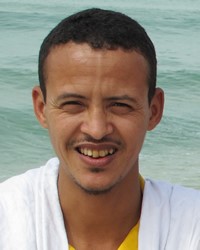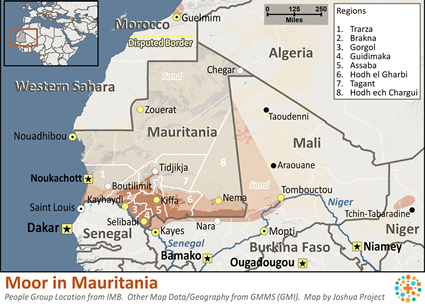The term “Moor” is generally applied to any person, regardless of skin color, who speaks one of the Hassaniyya dialects. The Moors are very proud people, conveying a sense of superiority to others in Mauritania.
Moors have four basic class divisions based on heritage, race, and occupation. The White Moors) form the two upper classes, while the Black Moors make up the two lower classes. A White Moor is ethnologically defined as "a nomad of Berber-Arab origin." They represent the two upper classes of Moorish society: the 'adma (nobility) and the lahma (commoners).
White Moors are the most powerful people in Mauritania. They control the government and economy. Most are farmers, however, though they probably have the best land in Mauritania.
White Moors faithfully follow the teachings of the Koran, and they believe these teachings come directly from above.
The Hassaniyya language only has limited biblical materials. It is hard for Muslims to accept the idea that they need a savior who is free from sin. They believe they can be in right standing with Allah by obeying the Koran.
Pray for individuals within the Moorish community to become spiritually prepared for the gospel when they initially hear it.
Pray for a rapid expansion of Christ's Kingdom among the Moors in Mauritania.
Pray also that the few believers among the Moors may be of the same mind, being one in spirit and purpose, looking not only to their own interests but also to the interests of others.
Pray for Moorish believers to become effective and fruitful in sowing God's word among their own families and communities to fuel a movement of God's blessings, spreading from household to household.
Scripture Prayers for the Moor, Beidane (White) in Mauritania.
https://www.101lasttribes.com/tribes/moor.html
| Profile Source: Joshua Project |


























